Midweek Review
Capitol Hill ‘Insurrection’
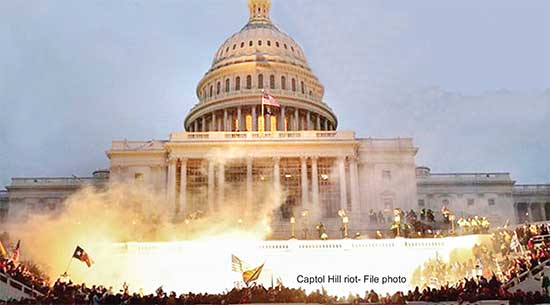
by Dr. Asoka Bandarage
According to the mainstream narrative, President Trump’s incitement of his supporters during the certification of Joe Biden’s electoral victory led to the ‘insurrection’ at the US Capitol on 6 Januar, resulting in the banning of Trump’s social media accounts, and his second impeachment by Congress.
According to so-called ‘conspiracy theories,’ however, the victory of the November presidential elections was ‘stolen’ from Trump through electoral frauds and the storming of the Capitol was staged or allowed to happen in order to impeach Trump and prevent him from coming back to power in 2024. It may be even more complicated; a report by the Swiss Policy Research website, for example, suggests that the right-wing QAnon movement, heavily supportive of Trump and prominent at the event, like Russiagate, is the product of an FBI psyop (psychological operation) launched to discredit Trump.
The public may never know the truth behind the 6 January events, the mysterious ‘Deep State’ or the growing polarisation between so-called pro-Trump white supremacist, ‘domestic terrorists’ and the anti-Trump multicultural, progressive liberals. However, the search for peace, justice and democracy at this critical time requires transcending simplistic polarisations and understanding the systemic roots of the conflict that is tearing America apart.
Polarization
Trump is a member of the ruling elite representing its own interests. His assaults on the environment and mismanagement of the Covid pandemic has put the entire country at risk. While claiming to represent the interests of the alienated and underprivileged white population, he introduced massive tax cuts and corporate deregulation worsening their social and economic position. His rhetoric against minorities and immigrants has exacerbated racial and ethnic tensions and political extremism.
Joe Biden and the Democratic Party, heavily funded by the billionaire class, also represent elite interests at the expense of the general population. Under the Obama administration, economic inequality increased and Black poverty, mass unemployment and police brutality persisted. The identity-focused rhetoric of liberals has stimulated racial and ethnic politics, and the rise of groups like Black Lives Matter. Often portrayed as progressive and “radical,” BLM has been significantly co-opted by corporate liberal interest and has received extensive funding from leading corporations including Amazon and Microsoft.
The corporate media has aided and abetted disunity and violence by silencing moderate and alternative voices that seek to understand and question the motives and strategies of both pro and anti -Trump extremists. The polarization of politics and media hinder and mask an understanding and dialogue needed to move forward. For example, is there an equal risk of fascism, albeit more insidious, arising from the corporate liberals opposing Trump?
Reclaiming Perspective
A handful of corporations led by big tech and finance control the US political process and practically all aspects of society. The overwhelming focus on identity politics deflects attention from the dangers of deepening techno-corporate control and the destruction of freedom of speech. The events of January 6 have already contributed to plans for a federal law against ‘domestic terrorism’ and the criminalization of dissent, which would likely be based on the 2019 Confronting the Threat of Domestic Terrorism Act introduced by California Representative Adam Schiff. Anti-terrorism acts, such as the Patriot Act, are notorious for their use in crushing dissent and marginalized groups.
Systemic violence and repression are not new to the United States. The noble ideals of democracy, freedom and human rights aside, the United States was founded on plunder of the land and exploitation of people – Native Americans, Blacks, Asians as well as underprivileged whites. Likewise, the American Empire was established and maintained with systematic plunder and exploitation and massive military and political interventions around the world that continue today.
The costly military adventures (now up to 2021’s approved $740 billion military budget), along with global economic shifts such as manufacturing and job outsourcing and displacement by technology, impoverished large segments of the US population, both white and people of colour. Corporate deregulation and the decimation of labor unions weakened the working class and strengthened corporate authoritarianism. In recent decades, Republican and Democratic parties have differed little in their pursuit of corporate and imperial interests.
While the United States has had a history of social movements for people’s rights including labor and civil rights, recent initiatives for systemic change have experienced serious setbacks. The anti-globalization movement that came to prominence during the WTO (World Trade Organization) meetings in Seattle in 1999 was undermined by the Patriot Act (with Joe Biden being a key architect) and other policies introduced soon after the 9/11 terror attacks.
The Occupy Wall Street movement that emerged following the 2008 financial crisis and its slogan ‘We are the 99%’ brought attention to the excesses of the financial sector and growing economic inequality. But this movement also dissipated, largely due to state and corporate tactics of division, repression and propaganda to reinstate the narrative.
In the electoral realm, despite an unprecedented grass roots movement backing him, Bernie Sanders was blocked from winning the Democratic presidential nomination by the party elite in both 2016 and 2020. The ideals of true socioeconomic reform have been squashed and subverted by the liberal establishment adopting the language of the progressive left but equating justice with racial and gender diversity and downplaying economic equality. This reframing channels the progressive energy away from threatening corporate control and profit, into a safe zone of identity politics, which only further divides and disempowers the general population.
Techno-oligarchy
 Just as unemployed and uninsured Americans are pleading for support during the Covid crisis, the combined wealth of US billionaires ‘surpassed $1 trillion in gains since March 2020 and the beginning of the pandemic,’ according to a study by the Institute for Policy Studies. The top five US billionaires – Jeff Bezos, Bill Gates, Mark Zuckerberg, Warren Buffett and Larry Ellison – saw their wealth grow by a total of $101.7 billion, or 26%, during this short period. The increasing digitalization of life during this period represent an enormous augmentation of the political and ideological power of the technocratic oligarchs.
Just as unemployed and uninsured Americans are pleading for support during the Covid crisis, the combined wealth of US billionaires ‘surpassed $1 trillion in gains since March 2020 and the beginning of the pandemic,’ according to a study by the Institute for Policy Studies. The top five US billionaires – Jeff Bezos, Bill Gates, Mark Zuckerberg, Warren Buffett and Larry Ellison – saw their wealth grow by a total of $101.7 billion, or 26%, during this short period. The increasing digitalization of life during this period represent an enormous augmentation of the political and ideological power of the technocratic oligarchs.
Silicon Valley tech firms, financial supporters of Joe Biden, withdrew attention from issues potentially harmful to his campaign. Even some left-leaning media platforms like the Intercept refused to publish an article critical of Biden just before the election. It led its co-founder, investigative journalist, Glen Greenwald to resign from the Intercept.
Social media companies swiftly deleted the accounts of President Trump and thousands of others following the January 6 event in Capitol Hill on grounds that they incite violence and extremism. While hate speech and incitement of violence should not be allowed, should a handful of unrepresentative, unregulated tech corporations, such as Facebook, Twitter, Google and YouTube exercise social and political control that exceed that of the state elected to represent people’s interests? Who decides what is appropriate and inappropriate and on what grounds?
Clearly, democratic policies and institutions are needed to oversee the First Amendment right of free speech. Elizabeth Warren, a candidate for the Democratic Presidential nomination, called for corporate accountability and planned to introduce policies for deregulation including the break-up of monopolistic companies like Facebook, Amazon and Google. However, given lack of support from the dominant corporate wing of the Democratic party, Warren was not able to secure even the Vice-Presidential nomination over Kamala Harris, the choice of the liberal corporate establishment.
System Change
The mainstream narrative propagated around the world paints a rosy picture of a return to a post-Trump era of freedom and democracy with the Biden-Harris inauguration on January 20. However, even if Trump is debarred from running for office in 2024, the attitudes and grievances of 70 million or more Americans who voted for him are unlikely to dissipate without serious efforts for change from those in power, and not just a return to corporate-dominated gesture-liberalism.
Indeed, all the issues of polarization and the inherent racism of society cannot be reduced to economic inequality and corporate dominance. Yet there has to be a recognition of the suffering and despair of ordinary people on both sides, be they incarcerated Blacks or unemployed whites. As economic inequality deepens and the middle class disappears, vast segments of people of colour as well as whites have become economically desperate and politically alienated from the status quo.
In the absence of genuine leaders to unite people and bring fundamental change, self-interested parties exploit and fuel discontent, anger and hatred by directing it towards each other. Use of epithets such as, ‘criminals and rapists’ against Latino immigrants by Trump and ‘basket of deplorables’ against Trump supporters by Hillary Clinton, have only fueled division and animosity. Political ‘street warfare’ between the extreme right Trump supporters and extreme left antifascist groups is now a common occurrence across the US.
It is urgent that more and more people speak up and help move society beyond the polarisation that is helping solidify techno-corporate totalitarianism and the police state. The us vs. them, good vs. bad dualism needs to be overcome with an appreciation of inherent human and planetary interdependence and the need for freedom and justice for all. To quote the words of Robert F. Kennedy on the assassination of Martin Luther King, Jr. on June 6, 1968:
“In this difficult day, in this difficult time for the United States, it is perhaps well to ask what kind of a nation we are and what direction we want to move in. [Y]ou can be filled with bitterness, with hatred, and a desire for revenge. We can move in that direction as a country, in great polarization…filled with hatred toward one another. Or we can make an effort … to understand and to comprehend, and to replace that violence, that stain of bloodshed that has spread across our land, with an effort to understand with compassion and love… What we need in the United States is not division; what we need in the United States is not hatred; what we need in the United States is not violence or lawlessness; but love and wisdom, and compassion toward one another, and a feeling of justice toward those who still suffer within our country, whether they be white or they be black.”
- News Advertiesment
See Kapruka’s top selling online shopping categories such as Toys, Grocery, Flowers, Birthday Cakes, Fruits, Chocolates, Clothing and Electronics. Also see Kapruka’s unique online services such as Money Remittence,News, Courier/Delivery, Food Delivery and over 700 top brands. Also get products from Amazon & Ebay via Kapruka Gloabal Shop into Sri Lanka.
Midweek Review
‘Professor of English Language Teaching’
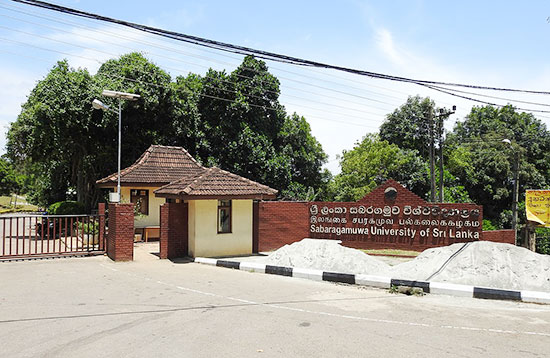
It is a pleasure to be here today, when the University resumes postgraduate work in English and Education which we first embarked on over 20 years ago. The presence of a Professor on English Language Teaching from Kelaniya makes clear that the concept has now been mainstreamed, which is a cause for great satisfaction.
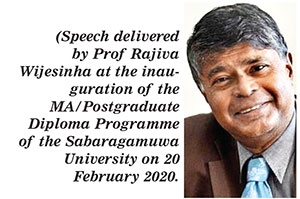 Twenty years ago, this was not the case. Our initiative was looked at askance, as indeed was the initiative which Prof. Arjuna Aluwihare engaged in as UGC Chairman to make degrees in English more widely available. Those were the days in which the three established Departments of English in the University system, at Peradeniya and Kelaniya and Colombo, were unbelievably conservative. Their contempt for his efforts made him turn to Sri Jayewardenepura, which did not even have a Department of English then and only offered it as one amongst three subjects for a General Degree.
Twenty years ago, this was not the case. Our initiative was looked at askance, as indeed was the initiative which Prof. Arjuna Aluwihare engaged in as UGC Chairman to make degrees in English more widely available. Those were the days in which the three established Departments of English in the University system, at Peradeniya and Kelaniya and Colombo, were unbelievably conservative. Their contempt for his efforts made him turn to Sri Jayewardenepura, which did not even have a Department of English then and only offered it as one amongst three subjects for a General Degree.
Ironically, the most dogmatic defence of this exclusivity came from Colombo, where the pioneer in English teaching had been Prof. Chitra Wickramasuriya, whose expertise was, in fact, in English teaching. But her successor, when I tried to suggest reforms, told me proudly that their graduates could go on to do postgraduate degrees at Cambridge. I suppose that, for generations brought up on idolization of E. F. C. Ludowyke, that was the acme of intellectual achievement.
I should note that the sort of idealization of Ludowyke, the then academic establishment engaged in was unfair to a very broadminded man. It was the Kelaniya establishment that claimed that he ‘maintained high standards, but was rarefied and Eurocentric and had an inhibiting effect on creative writing’. This was quite preposterous coming from someone who removed all Sri Lankan and other post-colonial writing from an Advanced Level English syllabus. That syllabus, I should mention, began with Jacobean poetry about the cherry-cheeked charms of Englishwomen. And such a characterization of Ludowyke totally ignored his roots in Sri Lanka, his work in drama which helped Sarachchandra so much, and his writing including ‘Those Long Afternoons’, which I am delighted that a former Sabaragamuwa student, C K Jayanetti, hopes to resurrect.
I have gone at some length into the situation in the nineties because I notice that your syllabus includes in the very first semester study of ‘Paradigms in Sri Lankan English Education’. This is an excellent idea, something which we did not have in our long-ago syllabus. But that was perhaps understandable since there was little to study then except a history of increasing exclusivity, and a betrayal of the excuse for getting the additional funding those English Departments received. They claimed to be developing teachers of English for the nation; complete nonsense, since those who were knowledgeable about cherries ripening in a face were not likely to move to rural areas in Sri Lanka to teach English. It was left to the products of Aluwihare’s initiative to undertake that task.
Another absurdity of that period, which seems so far away now, was resistance to training for teaching within the university system. When I restarted English medium education in the state system in Sri Lanka, in 2001, and realized what an uphill struggle it was to find competent teachers, I wrote to all the universities asking that they introduce modules in teacher training. I met condign refusal from all except, I should note with continuing gratitude, from the University of Sri Jayewardenepura, where Paru Nagasunderam introduced it for the external degree. When I started that degree, I had taken a leaf out of Kelaniya’s book and, in addition to English Literature and English Language, taught as two separate subjects given the language development needs of students, made the third subject Classics. But in time I realized that was not at all useful. Thankfully, that left a hole which ELT filled admirably at the turn of the century.
The title of your keynote speaker today, Professor of English Language Teaching, is clear evidence of how far we have come from those distant days, and how thankful we should be that a new generation of practical academics such as her and Dinali Fernando at Kelaniya, Chitra Jayatilleke and Madhubhashini Ratnayake at USJP and the lively lot at the Postgraduate Institute of English at the Open University are now making the running. I hope Sabaragamuwa under its current team will once again take its former place at the forefront of innovation.
To get back to your curriculum, I have been asked to teach for the paper on Advanced Reading and Writing in English. I worried about this at first since it is a very long time since I have taught, and I feel the old energy and enthusiasm are rapidly fading. But having seen the care with which the syllabus has been designed, I thought I should try to revive my flagging capabilities.
However, I have suggested that the university prescribe a textbook for this course since I think it is essential, if the rounded reading prescribed is to be done, that students should have ready access to a range of material. One of the reasons I began while at the British Council an intensive programme of publications was that students did not read round their texts. If a novel was prescribed, they read that novel and nothing more. If particular poems were prescribed, they read those poems and nothing more. This was especially damaging in the latter case since the more one read of any poet the more one understood what he was expressing.
Though given the short notice I could not prepare anything, I remembered a series of school textbooks I had been asked to prepare about 15 years ago by International Book House for what were termed international schools offering the local syllabus in the English medium. Obviously, the appalling textbooks produced by the Ministry of Education in those days for the rather primitive English syllabus were unsuitable for students with more advanced English. So, I put together more sophisticated readers which proved popular. I was heartened too by a very positive review of these by Dinali Fernando, now at Kelaniya, whose approach to students has always been both sympathetic and practical.
I hope then that, in addition to the texts from the book that I will discuss, students will read other texts in the book. In addition to poetry and fiction the book has texts on politics and history and law and international relations, about which one would hope postgraduate students would want some basic understanding.
Similarly, I do hope whoever teaches about Paradigms in English Education will prescribe a textbook so that students will understand more about what has been going on. Unfortunately, there has been little published about this but at least some students will I think benefit from my book on English and Education: In Search of Equity and Excellence? which Godage & Bros brought out in 2016. And then there was Lakmahal Justified: Taking English to the People, which came out in 2018, though that covers other topics too and only particular chapters will be relevant.
The former book is bulky but I believe it is entertaining as well. So, to conclude I will quote from it, to show what should not be done in Education and English. For instance, it is heartening that you are concerned with ‘social integration, co-existence and intercultural harmony’ and that you want to encourage ‘sensitivity towards different cultural and linguistic identities’. But for heaven’s sake do not do it as the NIE did several years ago in exaggerating differences. In those dark days, they produced textbooks which declared that ‘Muslims are better known as heavy eaters and have introduced many tasty dishes to the country. Watalappam and Buriani are some of these dishes. A distinguished feature of the Muslims is that they sit on the floor and eat food from a single plate to show their brotherhood. They eat string hoppers and hoppers for breakfast. They have rice and curry for lunch and dinner.’ The Sinhalese have ‘three hearty meals a day’ and ‘The ladies wear the saree with a difference and it is called the Kandyan saree’. Conversely, the Tamils ‘who live mainly in the northern and eastern provinces … speak the Tamil language with a heavy accent’ and ‘are a close-knit group with a heavy cultural background’’.
And for heaven’s sake do not train teachers by telling them that ‘Still the traditional ‘Transmission’ and the ‘Transaction’ roles are prevalent in the classroom. Due to the adverse standard of the school leavers, it has become necessary to develop the learning-teaching process. In the ‘Transmission’ role, the student is considered as someone who does not know anything and the teacher transmits knowledge to him or her. This inhibits the development of the student.
In the ‘Transaction’ role, the dialogue that the teacher starts with the students is the initial stage of this (whatever this might be). Thereafter, from the teacher to the class and from the class to the teacher, ideas flow and interaction between student-student too starts afterwards and turns into a dialogue. From known to unknown, simple to complex are initiated and for this to happen, the teacher starts questioning.’
And while avoiding such tedious jargon, please make sure their command of the language is better than to produce sentences such as these, or what was seen in an English text, again thankfully several years ago:
Read the story …
Hello! We are going to the zoo. “Do you like to join us” asked Sylvia. “Sorry, I can’t I’m going to the library now. Anyway, have a nice time” bye.
So Syliva went to the zoo with her parents. At the entrance her father bought tickets. First, they went to see the monkeys
She looked at a monkey. It made a funny face and started swinging Sylvia shouted: “He is swinging look now it is hanging from its tail its marvellous”
“Monkey usually do that’
I do hope your students will not hang from their tails as these monkeys do.
Midweek Review
Little known composers of classical super-hits
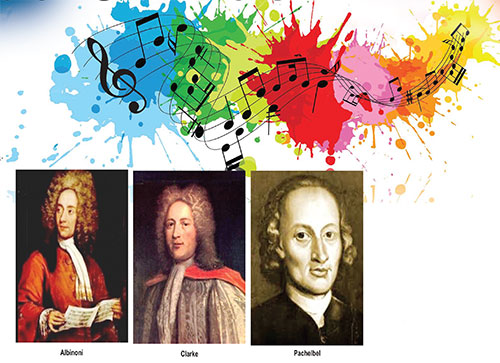
By Satyajith Andradi
Quite understandably, the world of classical music is dominated by the brand images of great composers. It is their compositions that we very often hear. Further, it is their life histories that we get to know. In fact, loads of information associated with great names starting with Beethoven, Bach and Mozart has become second nature to classical music aficionados. The classical music industry, comprising impresarios, music publishers, record companies, broadcasters, critics, and scholars, not to mention composers and performers, is largely responsible for this. However, it so happens that classical music lovers are from time to time pleasantly struck by the irresistible charm and beauty of classical pieces, the origins of which are little known, if not through and through obscure. Intriguingly, most of these musical gems happen to be classical super – hits. This article attempts to present some of these famous pieces and their little-known composers.
Pachelbel’s Canon in D
The highly popular piece known as Pachelbel’s Canon in D constitutes the first part of Johann Pachelbel’s ‘Canon and Gigue in D major for three violins and basso continuo’. The second part of the work, namely the gigue, is rarely performed. Pachelbel was a German organist and composer. He was born in Nuremburg in 1653, and was held in high esteem during his life time. He held many important musical posts including that of organist of the famed St Stephen’s Cathedral in Vienna. He was the teacher of Bach’s elder brother Johann Christoph. Bach held Pachelbel in high regard, and used his compositions as models during his formative years as a composer. Pachelbel died in Nuremburg in 1706.
Pachelbel’s Canon in D is an intricate piece of contrapuntal music. The melodic phrases played by one voice are strictly imitated by the other voices. Whilst the basso continuo constitutes a basso ostinato, the other three voices subject the original tune to tasteful variation. Although the canon was written for three violins and continuo, its immense popularity has resulted in the adoption of the piece to numerous other combinations of instruments. The music is intensely soothing and uplifting. Understandingly, it is widely played at joyous functions such as weddings.
Jeremiah Clarke’s Trumpet Voluntary
The hugely popular piece known as ‘Jeremiah Clarke’s Trumpet Voluntary’ appeared originally as ‘ The Prince of Denmark’s March’ in Jeremiah Clarke’s book ‘ Choice lessons for the Harpsichord and Spinet’, which was published in 1700 ( Michael Kennedy; Oxford Dictionary of Music ). Sometimes, it has also been erroneously attributed to England’s greatest composer Henry Purcell (1659 – 1695 ) and called ‘Purcell’s Trumpet Voluntary (Percy A. Scholes ; Oxford Companion to Music). This brilliant composition is often played at joyous occasions such as weddings and graduation ceremonies. Needless to say, it is a piece of processional music, par excellence. As its name suggests, it is probably best suited for solo trumpet and organ. However, it is often played for different combinations of instruments, with or without solo trumpet. It was composed by the English composer and organist Jeremiah Clarke.
Jeremiah Clarke was born in London in 1670. He was, like his elder contemporary Pachelbel, a musician of great repute during his time, and held important musical posts. He was the organist of London’s St. Paul’s Cathedral and the composer of the Theatre Royal. He died in London in 1707 due to self – inflicted gun – shot injuries, supposedly resulting from a failed love affair.
Albinoni’s Adagio
The full title of the hugely famous piece known as ‘Albinoni’s Adagio’ is ‘Adagio for organ and strings in G minor’. However, due to its enormous popularity, the piece has been arranged for numerous combinations of instruments. It is also rendered as an organ solo. The composition, which epitomizes pathos, is structured as a chaconne with a brooding bass, which reminds of the inevitability and ever presence of death. Nonetheless, there is no trace of despondency in this ethereal music. On the contrary, its intense euphony transcends the feeling of death and calms the soul. The composition has been attributed to the Italian composer Tomaso Albinoni (1671 – 1750), who was a contemporary of Bach and Handel. However, the authorship of the work is shrouded in mystery. Michael Kennedy notes: “The popular Adagio for organ and strings in G minor owes very little to Albinoni, having been constructed from a MS fragment by the twentieth century Italian musicologist Remo Giazotto, whose copyright it is” (Michael Kennedy; Oxford Dictionary of Music).
Boccherini’s Minuet
The classical super-hit known as ‘Boccherini’s Minuet’ is quite different from ‘Albinoni’s Adagio’. It is a short piece of absolutely delightful music. It was composed by the Italian cellist and composer Luigi Boccherini. It belongs to his string quintet in E major, Op. 13, No. 5. However, due to its immense popularity, the minuet is performed on different combinations of instruments.
Boccherini was born in Lucca in 1743. He was a contemporary of Haydn and Mozart, and an elder contemporary of Beethoven. He was a prolific composer. His music shows considerable affinity to that of Haydn. He lived in Madrid for a considerable part of his life, and was attached to the royal court of Spain as a chamber composer. Boccherini died in poverty in Madrid in 1805.
Like numerous other souls, I have found immense joy by listening to popular classical pieces like Pachelbel’s Canon in D, Jeremiah Clarke’s Trumpet Voluntary, Albinoni’s Adagio and Boccherini’s Minuet. They have often helped me to unwind and get over the stresses of daily life. Intriguingly, such music has also made me wonder how our world would have been if the likes of Bach, Handel, Haydn, Mozart, Beethoven, and Schubert had never lived. Surely, the world would have been immeasurably poorer without them. However, in all probability, we would have still had Pachelbel’s Canon in D, Jeremiah Clarke’s Trumpet Voluntary, Albinoni’s Adagio, and Boccherini’s Minuet, to cheer us up and uplift our spirits.
Midweek Review
The Tax Payer and the Tough
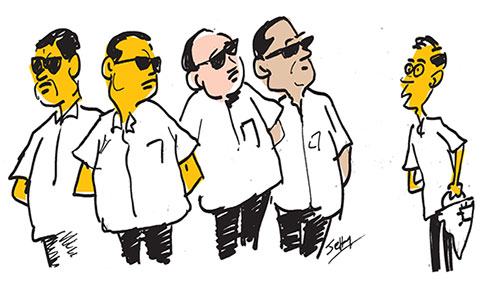
By Lynn Ockersz
The tax owed by him to Caesar,
Leaves our retiree aghast…
How is he to foot this bill,
With the few rupees,
He has scraped together over the months,
In a shrinking savings account,
While the fires in his crumbling hearth,
Come to a sputtering halt?
But in the suave villa next door,
Stands a hulk in shiny black and white,
Over a Member of the August House,
Keeping an eagle eye,
Lest the Rep of great renown,
Be besieged by petitioners,
Crying out for respite,
From worries in a hand-to-mouth life,
But this thought our retiree horrifies:
Aren’t his hard-earned rupees,
Merely fattening Caesar and his cohorts?









